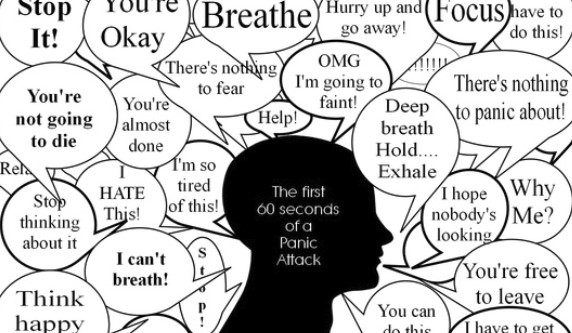
Can hypnotherapy treat anxiety
 Anxiety disorders affect 40 million Americans each year, which makes anxiety the most common mental illness in the United States.
Anxiety disorders affect 40 million Americans each year, which makes anxiety the most common mental illness in the United States.
There are many well-known forms of treatment for anxiety disorders including:
- cognitive behavioral therapy
- exposure therapy
- medication
But some people choose to treat their anxiety with alternative treatments like hypnotherapy.
What is hypnotherapy?
Contrary to what you’ve seen in movies, hypnosis involves a lot more than traveling into a trance-like state after looking into someone’s eyes.
During a hypnosis session, you undergo a process that helps you relax and focus your mind. This state is similar to sleep, but your mind will be very focused and more able to respond to suggestion.
While in this relaxed state, it’s believed that you’re more willing to focus on your subconscious mind. This allows you to explore some of the deeper issues you’re dealing with.
 Hypnotherapy sessions may be used to:
Hypnotherapy sessions may be used to:
- explore repressed memories, such as abuse
- instill a desire for healthy habits that can lead to weight loss
- help to relax and reprogram an anxious brain
The practitioner, or therapist, is there to help guide this process. They aren’t there to control your mind.
What are the benefits of using hypnotherapy to treat anxiety?
Even though hypnotherapy isn’t as widely known as psychotherapy and medication for treating anxiety, researchers and scientists have been studying the effects it can have on mental health conditions such as anxiety, post-traumatic stress disorder (PTSD), and depression for several years.
In one 2016 study, researchers scanned the brains of people while they were undergoing guided hypnosis sessions. They found that a hypnotized brain experiences changes in the brain that give a person:
- focused attention
- greater physical and emotional control
- less self-consciousness
How is hypnotherapy used to treat anxiety?
Let’s say you have a fear of flying. During a hypnotherapy session, the therapist can give you what’s known as a “posthypnotic suggestion” while you’re in a state of trance.
In this dreamlike state, the mind becomes more open to suggestion. This allows the therapist to suggest to you how easily confident you will be the next time you sit on a plane.
Because of the relaxed state you’re in, it can be easier to avoid escalating any anxiety symptoms you may feel, such as:
- a feeling of impending doom
- shortness of breath
- increased heart rate
- muscle tension
- irritability
- nervous stomach
 Hypnotherapy should be used as a complementary treatment to cognitive behavioral therapy.
Hypnotherapy should be used as a complementary treatment to cognitive behavioral therapy.
However, if you only use hypnosis to treat your anxiety, it could have effects similar to those of meditation. A hypnotic induction would help put you into this relaxed state, just like meditation. You can then use this state to address anxieties and phobias.
So, if you’re trying to treat a fear of flying, you can visualize yourself going back to the first time you were scared of flying. You can use a technique called hypnoprojectives, where you visualize your past events as you would’ve liked to have seen them. Then you see yourself in the future, feeling calm and peaceful while on a plane.
What you need to know before trying hypnotherapy
As long as you’re seeing a licensed mental health professional who has extensive training in hypnosis, the use of hypnotherapy to treat anxiety is considered very safe.
The first thing to consider when choosing a hypnotist is the practitioner’s qualifications. Look for a licensed mental health care professional — such as a psychologist, psychotherapist, psychiatric nurse practitioner, counselor, social worker, or medical doctor — who is also a hypnotherapist.
An effective overall treatment plan should include several modalities (approaches), and hypnotherapy is just one of the many clinically effective tools known to help treat anxiety.
You can also ask if they’re affiliated with any professional associations, such as the American Society of Clinical Hypnosis.
If for example, a hypnotist uncovers trauma while doing hypnotherapy, they need to know how to treat trauma. In other words, having the education and training to diagnose and treat mental health conditions — which comes from being licensed — is a key component in the success of hypnotherapy.
Healthline.com


 Hypnosis is perhaps one of the least understood therapeutic tools in use. While most people think of hypnosis as a way to get somebody to bark like a dog at the snap of your fingers or take off their clothes when you say the work ‘stupendous’, hypnosis can be a valuable tool in helping people overcome fears, withstand pain, or improve their ability to manage stress in their lives.
Hypnosis is perhaps one of the least understood therapeutic tools in use. While most people think of hypnosis as a way to get somebody to bark like a dog at the snap of your fingers or take off their clothes when you say the work ‘stupendous’, hypnosis can be a valuable tool in helping people overcome fears, withstand pain, or improve their ability to manage stress in their lives.
 How Self-Hypnosis Compares to Other Stress Reduction Methods
How Self-Hypnosis Compares to Other Stress Reduction Methods








